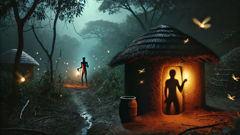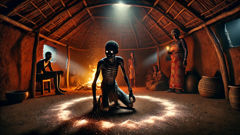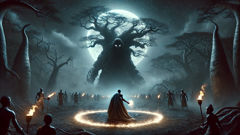Introduction
The Volta winds swept quietly across the sleeping Ewe village, carrying the scent of yams and cassava from sunbaked fields, and the tang of woodsmoke from hearths drowsing in the night. Deep in the ancient heart of Ghana, the land was a tapestry of greens and golds, of hills rolling into the horizon and groves where baobabs stood like guardians against the dark. The people lived in harmony with the earth and its spirits, honoring customs that shaped their days and safeguarded their dreams. But as dusk deepened to velvet, and the song of the crickets became a chorus of night, another sound slipped between the mud walls—a whisper of wings, so small and so quick that only the truly watchful noticed it. Old stories, told in the hush of evening by the light of crackling fires, warned of things that moved in the shadows: the Adze, a being older than memory, feared by all, and known to some only as a firefly. To outsiders, the Adze was just a myth, a tale to frighten children, to explain fevers and the sudden chill that sometimes stole into the bones. But to the Ewe, the Adze was real. It crept through villages on moonless nights, its glowing form darting between huts, bringing illness, suspicion, and terror. It could slip beneath doors, pass through keyholes, and vanish before one’s eyes, feeding on the living with a hunger that never ended. Tonight, beneath the endless Ghanaian stars, something had changed. A sickness crept from house to house, and the elders whispered of the Adze’s return. Yet in the heart of fear, a girl named Akua felt a flame of courage flicker. Guided by her grandmother’s wisdom and the stories of her people, Akua set out to uncover the truth behind the firefly’s curse—armed only with hope, the strength of her ancestors, and the enduring promise that light can outlast even the deepest darkness.
Whispers in the Dark
Akua was ten years old when the whispers first grew loud enough to chase sleep from her eyes. The air that night felt strange—thicker, as if woven with secrets. Her mother’s voice, soft and anxious, floated from the other room, and outside, her father’s footsteps circled their compound, heavy with unease. The night, usually so familiar, seemed to pulse with something new. Even the dogs cowered under the trees, and the chickens refused to stir.

Akua lay on her raffia mat, eyes wide open, staring at the dancing shadows thrown by the glow of their lantern. She remembered her grandmother’s stories: of days when men vanished without a trace, when children fell ill and could not be healed. The Adze was always blamed—a creature that could become a swarm of fireflies or take human form to walk among its prey. It was said to be impossible to catch, nearly impossible to kill, and always hungry for blood and chaos.
Her grandmother, Maame Efua, had been a storyteller and healer before age bent her spine and clouded her eyes. Every story she told had a lesson: never insult the river spirits, never sleep with your window open on a moonless night, and always pay attention to the little things. Tonight, Akua remembered those words as she heard a faint buzzing by the window—fainter than any mosquito, higher than any cricket. It was a sound that seemed to slip inside her thoughts.
She rose quietly, tiptoeing across the cool clay floor. Her mother was in the corner, pressing a damp cloth to Akua’s little brother’s forehead. He was burning with fever, his breaths shallow and quick. She looked up, worry etched deep in her brow, and nodded silently toward the door.
Outside, the night was alive with movement. Shadows fluttered at the edge of vision, and the fireflies blinked in strange, erratic patterns. Akua’s father paced near the gate, clutching a piece of wood tipped with charred palm leaves—a makeshift torch that sputtered bravely against the dark. He glanced at Akua, then at the sky. “Go back inside,” he whispered. “This isn’t a night for wandering.”
But Akua lingered, curiosity gnawing at her fear. She scanned the trees, searching for the source of the buzzing. One firefly hovered near the eaves, its glow stronger than the rest. For a moment, its wings cast a tiny, human-like shadow on the wall. Akua’s heart thudded. She remembered the stories: the Adze feeds on blood, it slips through cracks, and sometimes it wears the face of someone you trust. Was it watching her now? Was it the cause of her brother’s sickness?
She retreated inside and found Maame Efua sitting by the fire, eyes closed but alert. The old woman beckoned her close. “You feel it too,” she murmured. “The Adze walks tonight.”
“Can we stop it?” Akua whispered, her voice trembling.
Maame Efua reached for her hand, her touch surprisingly strong. “The Adze feeds on fear as much as blood. But it can be fought, if you are clever and brave. Remember the stories. Listen to the land.”
That night, Akua barely slept. Dreams of glowing wings and hungry shadows tangled with memories of laughter, of family, of life before fear crept in. When dawn came, the village was quiet, but the sickness had spread. Three more children had fallen ill, and by noon, a hush of suspicion circled through the village like vultures on a dying breeze. The elders gathered in the shade of the great baobab tree, muttering about old rivalries and new dangers.
By evening, a sense of urgency gripped the village. The chief called a meeting, his voice grave as he spoke of protection rituals, salt lines, and the need for vigilance. Some whispered about blaming strangers or punishing those whose eyes lingered too long in the dark. Akua watched as fear turned neighbors into enemies, and she wondered if that was part of the Adze’s curse—dividing people from each other, turning love into suspicion. But she also noticed Maame Efua gathering herbs and stones, quietly preparing something in secret.
“Tonight,” the old woman told Akua, “we will watch. The Adze returns to the place where pain is strongest. We will meet it there.”
So as twilight deepened and the first stars pricked the sky, Akua and her grandmother slipped through the hush of their home. They made their way to the healer’s hut, where sick children lay sleeping under woven blankets. Akua carried a bowl of salt and millet, while Maame Efua bore a charm wrapped in red cloth. They placed the offerings beneath the window, then settled into silence—waiting, hearts steady, breath held tight.
Hours passed. The world shrank to the circle of their lamplight, to the rustle of leaves and the distant cry of an owl. Then Akua heard it again—the softest hum, like a thousand tiny wings. She looked up just as a bright firefly glided through the open window. For an instant, its glow filled the room, and Akua saw its eyes—sharp, intelligent, and unmistakably human. The Adze.
The Firefly’s Secret
Akua’s heart stilled as she gazed into the Adze’s strange eyes. The creature hovered, its glow pulsating in the thick air. For a fleeting moment, the firefly’s light flickered between golden warmth and an eerie, sickly green. Maame Efua’s grip tightened on Akua’s arm. “Don’t move,” she whispered, voice barely audible above the Adze’s droning hum.

The room seemed to shrink around them. The Adze darted through the lamplight, circling the sick children, its wings humming at a pitch that made Akua’s teeth ache. She saw how the Adze lingered over each child’s face, almost as if savoring their fevered breaths. When it drew near Akua, her skin prickled with cold dread.
Suddenly, Maame Efua lifted her red-wrapped charm and began to chant in a language older than memory—a song woven with warning and power. The Adze recoiled, wings fluttering in agitation. It flashed across the room, seeking escape, but Maame Efua traced a line of salt across the sill. The firefly slammed against an invisible barrier and fell writhing to the floor, its glow dimming.
To Akua’s astonishment, the Adze began to change. Its small body elongated, its wings melted into flesh and skin. In moments, before their stunned eyes, a gaunt figure crouched in the shadows where the firefly had fallen—a thin, hunched man with gleaming eyes and teeth like bits of broken glass.
He hissed, eyes burning with hunger and hate. “You meddle with things you cannot understand, old woman.”
Maame Efua’s chin lifted. “I know your name, Adze. I know your hunger. You have no place among us.”
Akua clung to her grandmother’s side as the Adze prowled the edge of the salt circle. “Let me go,” he snarled. “Break the circle, and your brother will live.”
Akua’s heart twisted. Her brother’s illness—the Adze’s doing? The stories had never prepared her for the reality of evil so close. But Maame Efua’s voice remained steady. “You cannot bargain with darkness. There is always a price.”
The Adze spat at their feet. “You think you are safe? Fear and suspicion are my food. Even if you cast me out tonight, I will return. I will find another shape, another way in.”
But Maame Efua was already moving. She pressed her charm to Akua’s chest and began to chant again, her words resonating with the force of river and root. Akua felt a surge of warmth flow through her—a light that seemed to come from her very bones. The Adze screamed, clawing at his own skin as the circle of salt glowed brighter.
With a final howl, the Adze’s form collapsed inward. There was a flare of green fire, a scent of burned leaves, and then—nothing. Only the silence of the hut and the faint wheeze of sleeping children.
Akua and her grandmother slumped to the floor, breathless and shaken. The old woman pressed her palm to Akua’s cheek. “You were brave,” she whispered. “But this is not the end. The Adze does not die so easily.”
Outside, dawn crept over the fields. For the first time in many nights, birds sang again. The children woke without fever, and grateful mothers wept in relief. Yet an unease lingered—the sense that something had shifted in the balance between night and day.
Akua helped Maame Efua collect the salt and ashes, scattering them at the edge of the forest. “We have to tell the elders,” Akua said. “We have to warn everyone.”
But her grandmother shook her head. “Most will not believe. Some will blame each other. The Adze thrives on that. You must be watchful. You must remember what you saw.”
Days passed. Life in the village resumed its rhythms—farming, cooking, laughter returning in shy trickles. But Akua saw signs that others missed: a neighbor’s goat found dead with no wound; a patch of grass scorched black near the stream; a strange man passing through, his eyes darting from house to house. The Adze was not gone—it had only slipped into hiding.
One evening, while fetching water at dusk, Akua noticed a cluster of fireflies dancing over the river. She watched them carefully, searching for that unnatural glow. None seemed out of place—until one lingered by a patch of salt on the bank and flared with that same sickly green light. Akua’s resolve hardened. She would not let fear take root again.
She returned to Maame Efua, who was grinding herbs for a healing poultice. “The Adze is still here,” Akua said. “It’s waiting.”
Maame Efua looked into her granddaughter’s eyes and nodded. “You are ready. It’s time you learned what I know.”
That night, beneath the gaze of ancestors whose faces flickered in firelight, Akua began her apprenticeship. She learned the secrets of salt and red earth, of chants that echoed through time. She learned how to watch for the Adze—not only as a firefly, but in the shifting faces of neighbors and the twisted roots of trees.
And she learned that sometimes, courage meant standing alone against a darkness no one else could see.
The Night of Reckoning
The weeks that followed shaped Akua’s life forever. She and Maame Efua worked quietly, weaving protection into daily routines—mixing salt into thresholds, hanging amulets above doorways, telling children to keep close at dusk. Yet rumors spread like wildfire. Some villagers whispered that Maame Efua was a witch; others claimed Akua had brought the sickness by defying tradition. The Adze’s shadow stretched long—feeding on mistrust as much as blood.

Akua noticed how old friends averted their eyes and how strangers lingered at crossroads, glancing over their shoulders as if pursued. Yet each night, she and her grandmother kept vigil, listening for the telltale buzz of wings or the scrape of claws against clay.
One night, when the moon was only a sliver and clouds masked the stars, a scream shattered the silence. Akua leapt from her mat and raced outside. Near the edge of the village, a crowd had gathered around a small hut. Smoke curled from the roof, and a child sobbed in the doorway. The chief arrived, his staff tapping out an urgent rhythm as he demanded answers.
An old man—once a respected hunter—was dragged into the center. His eyes rolled wild with fear, his arms flailing as villagers accused him of consorting with spirits. Akua watched with horror as suspicion twisted into violence.
Maame Efua pushed through the crowd, her voice strong and steady. “Stop this madness! The Adze is not defeated by turning on each other.”
But fear drowned her words. Someone threw a stone; others shouted for punishment. Akua saw something then—a glimmer in the shadows behind the crowd, a spark of greenish light flickering by the granary. The Adze was here, watching them tear each other apart.
She forced her way toward the light, heart pounding. The firefly zipped past her ear and darted into the forest. Akua followed, leaving behind the chaos and noise. The world narrowed to moonlight and shadows, to roots clutching at her feet and branches snagging her dress.
She caught up to the firefly in a small clearing. There, beneath a twisted baobab, stood the Adze—no longer hiding in firefly form but as a gaunt man draped in tattered cloth. His eyes burned with triumph.
“You see how easy it is?” he sneered. “They destroy themselves. I barely need to lift a finger.”
Akua faced him, breathless but unbowed. “You won’t win. Not while I remember who you are.”
He laughed, sharp and cold. “You are just a child. What can you do against me?”
But Akua remembered Maame Efua’s teachings: courage is not the absence of fear, but the will to act despite it. She drew a line of salt at her feet and began to chant—a song for protection, for unity, for hope.
The Adze recoiled as the circle glowed. He lunged at Akua, but something unseen held him back. Around them, the night seemed to listen—the trees swayed closer, the wind carried whispers of ancestors’ voices.
Akua felt their strength pour into her words. She named the Adze, called out its hunger and its lies, refusing to let fear guide her actions. With every phrase, the creature shrank and twisted, his shadow shrinking until he was just a spark of light—trapped in the salt circle.
Maame Efua arrived then, her face alight with pride and relief. Together, they completed the ritual—binding the Adze with words and earth, with courage and truth.
The green firefly’s light sputtered and dimmed, then winked out entirely. The forest exhaled, releasing its breath.
They returned to the village at dawn. The air felt lighter; the dogs barked at nothing; laughter came easier. The villagers, still bruised by fear and regret, offered quiet thanks. Some never spoke of that night again, unwilling to face what they had seen in themselves.
But Akua knew: evil could be banished for a time, but only unity and vigilance could keep it away.
Conclusion
The legend of the Adze endures not because of its terror, but because of what it reveals about human nature and community. In the Ewe villages of Ghana, the old stories still warn children not to follow strange lights into the forest and to guard their hearts against fear and suspicion. Yet those same tales remind everyone that unity is stronger than any shadow and that courage lives in ordinary people who refuse to surrender to darkness. Akua grew into a wise woman, known far and wide as a healer and protector. She taught her children—and all who would listen—that evil may change its shape and name, but it can always be faced with open eyes and a steadfast heart. The Adze remains a lesson: trust each other, stand together, and remember that sometimes the smallest light—a single firefly in the dark—can hold back even the oldest night.













